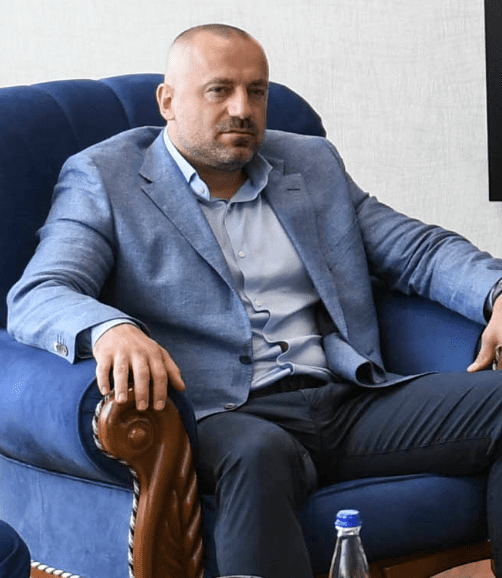
Photo: Photo by Armend NIMANI / AFP
A close associate of Serbian President Aleksandar Vučić, Milan Radoičić, has been accused of being an active participant in last Sunday’s shootout between about 30 heavily armed Serbs and Kosovo Police.
After the murder of a Kosovar Albanian policeman, Kosovo police special forces descended on a monastery in the village of Banjska in Northern Kosovo, where the assailants were holed up. Four Serb militants lost their lives in the skirmish, while most of the others managed to escape across the border, into Serbia.
Three were captured and are currently in police custody, having been charged with “terrorist acts” and “grave criminal offenses against the constitutional order and security.”

Radoičić, a businessman and deputy leader of Srpska Lista, an ethnic Serb political party in Kosovo that had become the dominant political force in Serb-majority Northern Kosovo—home to around 50,000 ethnic Serbs who largely reject rule from Pristina—is alleged to have ties to organized crime.
In 2013, he was accused of aiding and abetting abuse of a public position related to a mining project. He was also accused of illegal gravel excavation but eventually acquitted in 2019.
He has also been accused of, but never charged with, being linked to the assassination of Oliver Ivanović, leader of the Freedom of Democracy and Justice Civic Initiative, in 2018.
For his alleged links to organized crime and corruption, he has been under U.S. sanctions since late December 2021.
In 2017, Vučić called Radoičić a “guardian of Kosovo and Metohija” [an autonomous province as defined by Serbia’s Constitution, and which unilaterally declared independence in 2008].
A video released on Tuesday, September 26th, two days after the attack, by Kosovo’s Interior Ministry is said to show Milan Radoičić as being one of the attackers, and possibly their leader. Independent confirmation that the man shown in the video is in fact Radoičić remains absent.
Earlier, the ministry claimed that Radoičić’s papers and gun license were found in one of the vehicles it had confiscated in the area.
In the direct aftermath of the skirmish, Kosovo Prime Minister Albin Kurti published photos of weapons (including rocket launchers), trucks, 115 uniforms, and an armored vehicle that the attackers had left behind.
These military-grade arms & equipment—seized in @Kosovo_Police's anti-terror operation after yesterday's attack—leave no room for doubt: The perpetrators acted not alone but w/ state backing. Serbia must be held fully accountable for sponsoring terrorist violence on 🇽🇰 territory. pic.twitter.com/hbFHiV1rMe
— Albin Kurti (@albinkurti) September 25, 2023
The military-grade weaponry convinced Pristina of the fact that their owners had not acted alone, but had “state backing” [i.e. help from Belgrade].
Kurti added that “Serbia must be held fully accountable for sponsoring terrorist violence on Kosovar territory.”
Later on Wednesday, as reported by AFP, Kurti said that the quantity of weapons found in Sunday’s operation against Serb paramilitary gunmen was sufficient for “hundreds of fighters” and that a “bloodshed scenario” had been thwarted.
The U.S. is currently working together with Kosovo to determine who was behind the attack, which is as yet unclaimed by any group. “We are still doing our hard work to figure out exactly how and who is responsible and why,” U.S. Ambassador Jeffrey M. Hovenier said on Tuesday after meeting Kosovo President Vjosa Osmani.
“This was not a group of individual citizens spontaneously coming together to express concern,” Hovenier said, but one which was “trained” and “organized,” which pointed to “some structures behind them” providing training and equipment.
Belgrade has denied any involvement or indeed foreknowledge of the attack and maintains that the root cause is Kosovo’s mistreatment of residents in the Serb-majority area and that Pristina is using the incident to crack down on Srpska Lista and achieve it being banned.
“In the period to come,” said Milovan Drecun, chairman of the Serbian parliamentary committee on Kosovo-Metohija, “there will be demands to ban Srpska Lista activities and participation in any future elections to eliminate the factor of Serb unity and ties with Belgrade from Pristina’s political scene.”
Serbian authorities declared Wednesday a day of mourning “due to the tragic events,” without making any statement about the gunmen.
Defence Minister Miloš Vučević noted that “many in Serbia are jumping to conclusions as to what happened in Banjska on Sunday and how.”
“I have to remind you,” he added, that Serbia has had no de facto authority in Kosovo-Metohija since 1999, which makes it much harder for us and our authorities to gather all the facts.”
Serbia, he claimed, was being branded as the instigator or sponsor of terrorist acts as Serbs in Kosovo-Metohija were being portrayed as criminals and terrorists which, he argued, would give Pristina the excuse to, “do what they are doing in a manner that is contrary to all rules and procedures” under the guise of anti-terrorist operations.
Serbia has also expressed disappointment over the lack of response from KFOR, NATO’s 4,500-strong contingent, expected to keep the peace.
On Tuesday, Vučić met with the ambassadors of the U.S., the EU, the UK, France, Germany, and Italy in Belgrade, where he demanded that KFOR “take care of all security issues in the north of Kosovo instead of Kurti’s police.”
